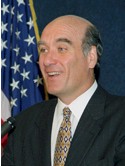|
Letter from Commerce Sec. William
Daley to Rep. Tom Bliley (R-VA).
Re: pending bills to limit FCC antitrust merger review authority.
Date: circa May 4, 2000.
Source: Department of Commerce.
Editor's Note: the letter was sent to Sen. John
McCain, Sen. Orrin Hatch, Sen. Ernest Hollings Sen. Patrick Leahy, Rep.
Thomas Bliley, Rep. Henry Hyde, Rep. John Dingell, and Rep. John Conyers
(the Chairman and ranking minority members of the House and Senate
Commerce and Judiciary Committees). |
|
 |
|
The Honorable Thomas J. Bliley, Jr.
Chairman
Committee on Commerce
House of Representatives
Washington, DC 20515-6115
Dear Mr. Chairman:
I am writing to express concern about pending legislation that would restrict
the authority of the Federal Communications Commission (FCC or Commission) to
review mergers and impose conditions on licenses and other authorizations
assigned or transferred in the course of mergers.
The market-opening provisions of the Telecommunications Act of 1996 have
sparked an economic boom in the telecommunications industry. This boom, coupled
with the convergence of technologies and the increasing globalization of
markets, has resulted in an unprecedented increase in the number of
merger-related activities. Because the overall impact of the growth of mergers
is unclear, careful and thorough government review of individual transactions is
essential to ensure that the resulting industry consolidation does not harm
competition, consumers or the Nation. Mergers in the telecommunications
industry, by nature, require the transfer of licenses, and the Communications
Act of 1934 clearly requires the Commission to review the transfer of control of
licenses taking into account the public interest, convenience and necessity
standard. See e.g., 47 U.S.C. §§ 214(a), 307(a), 310(b)(4), 310(d).
Both the Department of Justice and the Federal Trade Commission conduct
merger reviews under the antitrust laws. Their activities are not the same as
the Commission's analysis, and do not vitiate the need for independent
Commission review. The Commission employs a public interest standard, has
affirmative market-opening goals, and initiates a public comment process. And
while the Federal Trade Commission has been active in mergers involving the
cable and entertainment industries, it is barred by the Clayton Act from
exercising jurisdiction over common carriers.
Recent legislation seeks to limit the Commission's role in approving mergers
by limiting the amount of time that the Commission has to approve a merger, or
by limiting the Commission 's authority to impose conditions on merger
approvals. I agree that FCC merger reviews should be completed expeditiously,
and with predictable and transparent standards. I believe, however, that
imposing time limits on FCC merger reviews ignores the fact that each merger
presents different issues and concerns, some more difficult and complex than
others. "Shot clock" time limits may not give the Commission
sufficient time to conduct a thorough public interest analysis. This approach
could also limit any flexibility that parties may need to amend applications to
address particular concerns, deficiencies, or changing circumstances. As a
result, the Commission may be forced to deny an application that would otherwise
be approved if the parties were afforded sufficient time to address public
interest concerns.
I also oppose legislation that restricts the Commission's authority to impose
conditions on parties to a merger. As the chief regulator for the
telecommunications industry, the Commission must not be restricted in
considering the ways that mergers and consolidations affect numerous public
interest issues such as national security, law enforcement, cross-ownership,
local competition, and universal service. In fact, cross-ownership, which
affects content, diversity, and localism issues, is a serious concern to the
American public with respect to consolidation in the communications sector.
Finally, I would note that the Commission has undertaken its own study of its
merger review process. On January 12, 2000, Chairman Kennard directed the
Commission's General Counsel to assess the Commission's merger review process to
determine how to facilitate future FCC merger reviews while ensuring that the
public interest is met. This "transaction team" is also establishing
procedures to ensure that the internal merger review procedures are uniform,
transparent, and streamlined. I believe strongly that the Commission should have
an opportunity to complete its merger review and implement its processes. These
steps by the Commission eliminate the need for further congressional action.
Sincerely,
William M. Daley
